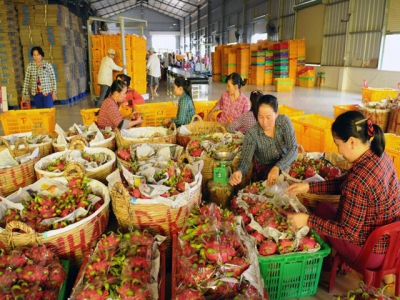Weak linkages result in low competitiveness of farm products

Many localities across the country have identified agricultural products as key to their economic development. However, lack of linkage chains and processing weaknesses have made the value of agricultural products uncompetitive.
Weak, missing linkages
Land in the Central Highlands province of Dak Lak is quite favorable for agricultural production. According to the Dak Lak People’s Committee, the province reached US$600 million in export turnover in 2018, an increase of 4.35 percent compared to the previous year. The majority of exports such as raw coffee, instant coffee, cassava starch and rubber products recorded an increase in volume and value.
However, Dak Lak Province faces difficulties in farm produce processing. According to the Dak Lak People’s Committee, there are very few processing and preserving factories in the locality, especially for fruit and vegetables, and key farm produce. Currently, most local businesses are small and medium-sized enterprises, with limitations in terms of capital, technologies and high-quality human resources, making it difficult for them to create high-value products and improve competitiveness.
Some linkages in the value chains of agricultural products have been formed, but are still spontaneous and at the stage of preliminary processing. There is no connection between production, processing and consumption, and added value remains low.
The south-central coastal province of Binh Thuan has many advantages in agricultural development, with key farm produce like dragon fruit, cashew nuts and rice. Since 2016, some 57 cooperatives have been established, while 18 cooperation models in production and consumption have been built.
Cooperation models have initially proven efficient, helping production. For example, the Thuan Tien Dragon Fruit Cooperative has cooperated with E.K PRIMA Vietnam Co., Ltd to export 100 tonnes of dragon fruit per year to Europe, and with the VinEco Agricultural Investment, Development and Productions LLC to sell an average of one tonne per day of dragon fruit in the domestic market.
Binh Thuan Province is also promoting cooperation with the Nafoods Group to invest in the development of material areas for safe and organic dragon fruit covering 10,000ha.
However, the province faces difficulties in linkages between processing and consumption. The current types of linkages only focus on the supply of input materials and services, but do not form complete value chains. In addition, models associated with production and consumption are few and not sustainable.
Lack of linkage chains and processing weaknesses make the value of agricultural products uncompetitive.
Institutional reforms
Nguyen Quoc Toan, director of the Agro Processing and Market Development Authority under the Ministry of Agriculture and Rural Development, said the ministry would pay attention to promoting institutional reforms, completing the legal framework, and improving the business and investment environment to attract investment in the agricultural sector.
Agricultural restructuring will be promoted further with the formation of three product categories - national key products, local key products and those under the program “one village, one product”. National key agricultural products are those with an export value of at least US$1 billion each. Local key products are those that make up a major proportion of agricultural production and have great potential for expansion and technological application. The “one village, one product” program focuses on special local products to ensure they are preserved and promoted. On the local level, Dak Lak Province will provide support to reduce losses in agricultural production, simplify administrative procedures, and raise capital from the central and local budget to help businesses develop linkage chains from production to consumption.
Binh Thuan Province is implementing a project to develop 15,000 cooperatives and unions of agricultural cooperatives until 2020. The province will devise support policies for production and consumption of agricultural products in the locality.
In addition to coordination between central management agencies, local authorities must take part in agricultural production planning. Promoting high-tech application, focusing on deep processing, and increasing the technological content of finished agricultural products are extremely important and necessary, helping to boost the value of Vietnam’s agricultural sector in general and localities in particular.
Related news
 Fruit and vegetable exports decline during first quarter
Fruit and vegetable exports decline during first quarter The export turnover of fruits and vegetables for the first three months of 2019 fell by nearly 10 percent in comparison to the same period last year
 Q1 rice export volumes and value down
Q1 rice export volumes and value down Rice exports in the first quarter of 2019, with volumes estimated at 1.43 million tons worth $593 million, down 3.5 per cent in volume and 20.2 per cent
 Parched Central Highlands urged to use efficient irrigation systems
Parched Central Highlands urged to use efficient irrigation systems The Tây Nguyên (Central Highlands) provinces should speed up the use of efficient irrigation technologies to mitigate the effects of droughts and water shortage